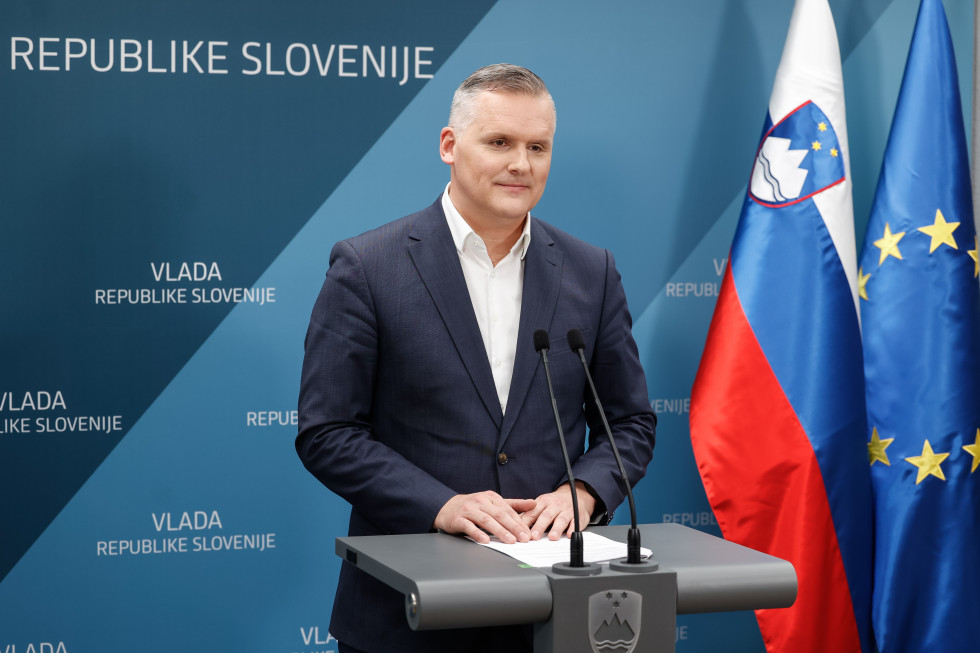34th regular session of the Government of the Republic of Slovenia

Minister of the Environment, Climate and Energy Bojan Kumer | Author STA/Nebojša Tejić
The amendment to the Decree on setting natural gas prices from the system sets out a maximum price for gas used to produce heat in heat distribution systems (district heating systems) for kindergartens, primary schools and essential social services institutions. The maximum permitted retail price of natural gas required for the production of heat for essential social services institutions, kindergartens, primary schools and health centres is set at €0.079/kWh following the adoption of this decree. The decree applies to natural gas used for the production of heat supplied during the period from 1 January 2023 to 31 August 2023.
The Government approved the text of the contract for the public service of the Slovenian Press Agency in 2023. The value of the contract is set at €2,271,600, which is an increase of €243,600 on 2022. The Government has authorised Petra Bezjak Cirman, Acting Director of the Government Communication Office, to sign and implement the contract.
The adoption of the proposed amendment to the State Administration Act, which defines the competences of the ministries and the transfer of competences or areas of work, will allow the Government to start functioning in accordance with the organisation of the Government as adopted by the National Assembly in the amendment to the Government of the Republic of Slovenia Act. The implementation of the amendments to the Government of the Republic of Slovenia Act and, consequently, the State Administration Act was delayed due to a subsequent legislative referendum, where the will of the people was made clear. This is ultimately of significance due to the referendum decision that the government can start operating as soon as possible in line with the amendments to the Government of the Republic of Slovenia Act that were approved in the legislative referendum. This will allow the Government to optimise the exercise of its executive function and will not jeopardise the implementation of the Recovery and Resilience Plan and the European Cohesion Policy in the next programming period.
The main solution introduced by the proposed amendment to the Scientific Research and Innovation Act is the establishment of a single Agency for Scientific Research and Innovation (ARIS), which will allow for a more efficient and consistent implementation of scientific research and innovation policy measures. The amendment is also necessary to implement the provisions of the Government of the Republic of Slovenia Act, which merges the activities in the fields of scientific research and innovation into a single ministry. In addition to administrative streamlining, the introduction of a single agency will also allow for the interlinking of content and the continuous support of activities along the whole technology readiness ladder.
The main objectives of the proposed amendment to the Service in the Slovenian Armed Forces Act are to further increase the interest of citizens in recruitment in the Slovenian Armed Forces by providing for the possibility of recruiting soldiers who have completed primary school, provided that they also conclude a contract undertaking to obtain a secondary vocational education, secondary general education or secondary technical education at the time of concluding their employment contract. The draft law also regulates the specificities of the working time of soldiers on high alert, which constitutes an exception to the working time laid down in the Defence Act, the Employment Relationships Act and Directive 2003/88/EC, i.e. it may be evenly or unevenly distributed, irrespective of the provisions of the regulations on the time limits of daily, weekly or monthly working obligations, breaks, daily or weekly rest periods and work exceeding full-time work. This specifically excludes the protection of certain categories of workers who enjoy special protection under the general regulations. Protection is still provided to certain categories of workers, specifically listed in the draft law, during periods of exceptional circumstances or a state of high alert.

